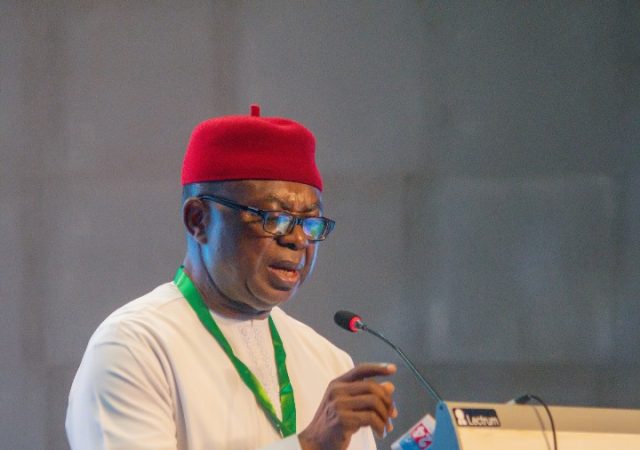
Managing Director ARM Investment Managers, Kai Orga’s experience in the financial services sector spans over 25 years as a Banker, Financial Planner and Wealth Advisor. She started out in the banking sector and also has experience in Investment Management. Her competencies cover financial planning, wealth management, sales and business development, customer relations, credit and marketing, business administration, human and personnel development, branch expansion amongst others. Kai has a second degree (M.Sc. Management and Information Systems) from the Institute for Development Policy and Management (IDPM) Manchester – UK and a B.Sc. degree in International Studies, Ahmadu Bello University, Zaria.
She also has a certificate as a Chartered Wealth Management Professional from the (International Academy of Business & Financial Management) IABFM- (USA), She is an Honorary Senior Member, Chartered Institute of Bankers of Nigeria. (HCIB), Associate Member Nigerian Institute of Management (AMNIM). She has also attended several professional and strategic programmes over the years, trained by the Coaching Academy, UK. Kai is a Master Practitioner Neurolinguistics Coach and she has been certified by the Centre for Management Development, Nigeria. She is a Fellow of the Institute of Business Development, Nigeria (FBDI). She is also a member, Institute for Management Consultants of Nigeria.
As a Personal and Business Development Trainer and Coach, her competencies include financial and wealth creation strategies, personal mastery and talent identification, youth development, human and personnel development, entrepreneurial development, employability and business innovation, business transformation, finance and strategy. Kai mentors, coaches and trains individuals, small businesses, and various organizational bodies providing them with the attitude, skills and knowledge to succeed in the ever-changing dynamic environment. She has been training and assisting individuals and organizations on wealth strategies and creation for over 2 decades. She has a track record of consistent accomplishment in maximizing individual and business/corporate performance.
Kai speaks exclusively to Sunday Oyinloye, Publisher, Green Savannah Diplomatic Cable
Excerpts:

As a Financial Planner, Wealth Advisor, and former Banker, what are the common reasons for business failures?
As someone deeply entrenched in the financial industry, I have witnessed firsthand why businesses hit roadblocks and, unfortunately, don’t make it. A common misstep is underestimating the power of solid financial planning. It’s not just about the numbers – a robust plan involves budgeting, cash flow management, and contingency planning, and is crucial to establishing a solid financial foundation and protecting against economic downturns and unforeseen expenses. In today’s dynamic business world, flexibility is key, and those who fail often miss the memo on strategic planning and adaptability. The game changes constantly; businesses need to pivot, innovate, and keep pace with emerging trends to avoid being left behind. Poor risk management is another critical factor. Successful ventures are like savvy gamblers – they know how to identify, assess, and hedge against financial, operational, and market risks. Failing in this department can lead to substantial setbacks. Effective communication and relationship management, both internally and externally, are the unsung heroes of business success. It’s not just about what is said but how it is said. Strong partnerships and transparent communication within the organization are the pillars of sustainable growth. Lastly, resilience is non-negotiable. Entrepreneurship is a rollercoaster, and setbacks are part of the ride. The businesses that weather the storm learn from failures, using them as stepping stones for improvement. In essence, it’s not about avoiding failures but about bouncing back stronger.
What basic steps should a new entrepreneur take to succeed in business?
Embarking on the entrepreneurial journey is both exhilarating and challenging. To set the stage for business success, new entrepreneurs should strategically navigate several key steps. Start with in-depth market research as the cornerstone. Understanding the target audience, industry trends, and competitors lays the foundation for a solid business plan. This plan, a comprehensive roadmap encompassing the business’s mission, goals, target market, marketing strategy, financial projections, and operational plan, not only guides decisions but also attracts investors or financing. Next, building a sturdy financial foundation is pivotal. Smart financial management, inclusive of budgeting, cash flow monitoring, and contingency planning, serves as a compass through unforeseen challenges. Networking also plays a vital role. Cultivating relationships with professionals, mentors, and potential customers not only offers guidance and support but also opens doors to opportunities and valuable insights. In today’s dynamic business environment, adaptability and innovation are non-negotiable. Staying informed about industry trends and being open to pivoting is essential for competitiveness and sustained relevance. Effective marketing and branding are indispensable. Building an online presence, leveraging social media, and establishing a distinct brand identity attract customers and differentiate the business. Lastly, time management and achieving a work-life balance are paramount. While entrepreneurship demands dedication, avoiding burnout is essential for prolonged success.

Why do some of our youth turn to money rituals, scams, and illegal means for financial gain?
It is disheartening to witness some young individuals resorting to illegal and unethical means, such as money rituals and scams, in their pursuit of a livelihood. This complex issue stems from a mix of social, economic, and educational factors. Economic disparities and limited opportunities are primarily responsible for driving young people towards unconventional paths for financial success. When traditional avenues for advancement seem restricted, some may perceive illicit activities as a quick route to prosperity. Societal pressures and unrealistic expectations also contribute to a sense of desperation among the youth. The prevailing belief that success is solely measured by material wealth can lead individuals to adopt extreme measures for financial gain. Pop culture and social media wield significant influence, glamorizing illicit activities in certain circles and distorting perceptions of success. Promoting positive role models and sharing stories of legitimate success can help reshape these distorted perceptions. Insufficient education and awareness compound the issue. The lack of financial literacy and understanding of legal and ethical business practices leaves individuals susceptible to engaging in harmful activities. Educational institutions and community organizations play a pivotal role in instilling values and guiding the youth toward responsible and lawful paths to success. As a society, fostering an environment that promotes inclusivity, equal opportunities, and a sense of purpose among young people is crucial. This involves creating more avenues for skill development, mentorship programs, and support networks to empower them to pursue legal and ethical paths to success. Ultimately, addressing the root causes of these behaviors requires a comprehensive and collaborative effort involving parents, educators, community leaders, and policymakers. By creating a supportive environment and addressing underlying issues, we can guide young people away from illegal activities and towards more positive and constructive paths in life.
How can the Nigerian government implement practical measures to stabilize the value of the Naira, addressing one of the country’s significant challenges?
The unpredictability of the Naira poses a significant challenge to Nigeria’s economic stability. To address this issue and ensure a stable currency, a comprehensive strategy involving both short-term and long-term measures is crucial. Firstly, the government should focus on implementing sound monetary policies. This entails maintaining transparency in monetary operations, controlling inflation, and stabilizing the exchange rate. Transparent policies instill confidence in the financial system and contribute to a more predictable Naira. Managing foreign exchange reserves effectively is another key step. By building and managing reserves, the government can intervene in the market when necessary, providing a buffer against external shocks and helping stabilize the Naira’s value. Diversifying the economy is essential for reducing reliance on oil exports. Investing in sectors like agriculture, manufacturing, and technology creates a more balanced economic landscape, contributing to a stable currency. Prioritizing fiscal discipline is crucial to managing budget deficits and avoiding excessive money supply, which can lead to inflation and currency pressure. A disciplined fiscal approach contributes to overall economic stability. Investment in infrastructure is a fundamental aspect of attracting foreign investment and stimulating economic growth. A robust infrastructure framework enhances confidence in the Naira and supports a stable economic environment. Promoting export industries beyond oil is vital for boosting foreign exchange earnings. Incentivizing and supporting non-oil exports helps reduce dependence on oil revenue, contributing to a more stable currency. Maintaining transparency in exchange rate policies is key to managing expectations and reducing speculative activities. Clear communication about exchange rate decisions builds trust in the government’s economic management. Collaboration with stakeholders, including the private sector, financial institutions, and international organizations, is essential. Inclusive decision-making ensures a comprehensive and well-rounded approach to currency stability. Implementing investor confidence-building measures, such as business-friendly reforms and protecting investors’ rights, creates a stable political and economic environment. This, in turn, attracts foreign investment and supports a stable Naira. Continuous monitoring of economic indicators and timely policy adjustments are necessary to respond to changing conditions. Regular assessments and adjustments contribute to maintaining currency stability over the long term.
Many Nigerians are worried about the challenge of brain drain, particularly concerning economic migrants, how can we work towards its reduction as a nation?
The challenge of brain drain in Nigeria demands a comprehensive strategy to curb the exodus of skilled professionals. Here are ten key strategies to reduce economic migration and retain valuable talent:
Enhance Working Conditions: Elevate working conditions by offering competitive salaries, attractive benefits, and ample professional development opportunities to make Nigeria an appealing workplace.
Prioritize Education and Research: Invest significantly in education, research, and development to foster a knowledge-based economy. Ensure adequate funding for educational institutions, scholarships, and research programs.
Address Infrastructure Challenges: Tackle infrastructure issues such as reliable power supply, transportation, and healthcare to enhance the overall quality of life for professionals, making Nigeria a more attractive place to live and work.
Support Entrepreneurship: Encourage and support entrepreneurship to provide alternative career paths. Foster a conducive ecosystem for startups, including access to funding and mentorship programs.
Promote Collaborations: Facilitate collaborations between the government and the private sector to create job opportunities and career advancement. Develop industries that attract and retain skilled professionals.
Continuous Professional Development: Establish avenues for continuous professional development, including training programs, workshops, and mentorship initiatives. Keeping individuals engaged and motivated contributes to talent retention.
Flexible Work Arrangements: Offer flexible work arrangements, such as remote work options and flexible hours. Improving work-life balance makes staying in the country more appealing to skilled professionals.
Acknowledge and Reward Contributions: Recognize and reward the contributions of skilled professionals through awards and recognition. Boosting morale creates a sense of pride and loyalty.
Implement Pro-Growth Policies: Introduce policies and reforms that promote economic growth, reduce bureaucracy, and create a conducive business environment. These measures contribute to job creation and retention.
Establish Diaspora Networks: Build a supportive diaspora network connecting professionals within the country and abroad. Foster collaboration, mentorship, and knowledge exchange to strengthen ties and encourage skilled individuals to contribute to Nigeria’s growth.
How successful have Nigerian women been in achieving financial inclusion, considering your focus on promoting financial accessibility?
Promoting financial inclusion is integral to economic progress, and when evaluating its status among different demographic groups in Nigeria, a closer look at women’s participation reveals a mix of advancements and challenges. Despite concerted efforts to enhance financial inclusion, obstacles persist for women, influenced by limited educational access, cultural norms, and gender-based discrimination. Nevertheless, several positive initiatives aim to address these issues. Microfinance institutions and empowerment programs tailored for women have played a pivotal role in elevating financial inclusion. By providing small loans, financial education, and training, these initiatives empower Nigerian women to initiate or expand their entrepreneurial ventures. The rise of digital financial services, particularly mobile banking and digital payment platforms has substantially expanded opportunities for financial inclusion. This is especially significant for women residing in rural areas where physical banking infrastructure is often lacking. The Nigerian government, through policies and initiatives spearheaded by the Central Bank of Nigeria (CBN), has taken strides to improve women’s access to financial services, particularly those engaged in entrepreneurship. Acknowledging the distinct financial challenges faced by women, certain financial institutions have introduced specialized products, including tailored savings accounts, loans, and insurance plans, aimed at addressing their unique needs. Financial literacy programs designed specifically for women have proven instrumental in augmenting their comprehension of financial matters. This empowerment enables them to make informed decisions regarding savings, investments, and overall financial planning. Despite these positive developments, persistent gender-based disparities, limited awareness of available financial services, and existing legal constraints continue to impede the complete financial inclusion of Nigerian women. Recognizing the economic significance, ongoing efforts are imperative to dismantle cultural and systemic barriers, expand financial education initiatives, and cultivate an environment conducive to women’s participation in entrepreneurship. Collaborative efforts involving the public and private sectors, NGOs, and international organizations are essential to realizing these objectives.
Would you say you are actively promoting and nurturing the entrepreneurial spirit among the younger generation to facilitate their growth and success?
As an advocate for fostering entrepreneurship, I strongly believe in empowering the younger generation to embrace the challenges and opportunities of starting their businesses. Here are some of the initiatives I am actively involved in to encourage and support young entrepreneurs:
- Mentorship Programs: I am deeply involved in mentorship programs, sharing my experiences, and offering practical advice to guide and inspire aspiring entrepreneurs. Through one-on-one interactions, I aim to provide valuable insights that contribute to their professional development.
- Educational Workshops and Seminars: I organize and participate in workshops and seminars designed to equip young individuals with the essential skills and knowledge necessary for initiating and expanding their businesses. These events cover diverse aspects of entrepreneurship, ensuring a comprehensive learning experience.
- Networking Events: Facilitating networking events is a crucial part of my approach. These gatherings connect young entrepreneurs with seasoned professionals, investors, and like-minded individuals. The emphasis is on fostering collaboration, facilitating learning, and creating potential partnerships that can elevate their ventures.
- Startup Incubators and Accelerators: I actively support startup incubators and accelerators that provide resources, mentorship, and funding. These initiatives play a pivotal role in assisting young entrepreneurs in transforming their innovative ideas into successful and sustainable ventures.
- Financial Literacy Initiatives: I engage in initiatives focused on promoting financial literacy among the younger generation. By enhancing their understanding of financial matters, I empower them to make informed decisions and effectively manage their entrepreneurial endeavors.
- Online Platforms and Resources: Leveraging the digital age, I contribute to online platforms and create resources offering valuable information and guidance on various entrepreneurial topics. This ensures accessibility to a wealth of knowledge for those navigating the complexities of entrepreneurship.
- Advocacy for Entrepreneurial Education: I advocate for the inclusion of entrepreneurial education in formal education systems, emphasizing its importance from an early age. This approach aims to equip young individuals with the necessary skills for success in the dynamic landscape of business.
- Community Engagement: Actively engaging with local communities is a cornerstone of my efforts. By understanding specific needs and challenges, I tailor initiatives to address the unique circumstances of aspiring entrepreneurs in different regions.
Share your vision for Nigeria’s economic development with our readers.
In envisioning the economic development of Nigeria, my dream is anchored in a transformed and diversified economy, breaking away from dependence on unpredictable commodity prices. I see Nigeria strategically utilizing its rich human and natural resources to establish thriving industries in agriculture, manufacturing, technology, and renewable energy. This shift not only ensures economic stability but also creates a multitude of employment opportunities, addressing the needs of our growing population. A key aspect of my vision is a robust Small and Medium-sized Enterprise (SME) sector in Nigeria. I visualize an entrepreneurial-friendly environment with streamlined processes, accessible financing options, and comprehensive support structures for startups. A flourishing SME sector not only stimulates economic activity but also acts as a catalyst for innovation and plays a substantial role in job creation. Education stands as a cornerstone in my vision, with every child having access to quality education that equips them with the skills necessary for success in the 21st-century economy. I foresee a well-educated and skilled workforce becoming a driving force behind innovation, enhancing productivity, and fueling sustained economic growth. Infrastructure development is a top priority in my vision. Nigeria invests significantly in modern and reliable infrastructure, including efficient power supply and transportation networks. This not only facilitates seamless business operations but also contributes to an overall improvement in the quality of life for our citizens. Sustainability is integral to my vision, emphasizing environmental conservation, responsible resource management, and the widespread adoption of green technologies. This commitment ensures that economic development progresses together with environmental preservation, safeguarding the well-being of future generations. Furthermore, my vision for Nigeria promotes inclusivity, where economic opportunities are accessible to all, irrespective of gender, ethnicity, or socio-economic background. Policies that foster equality and social justice contribute to a more stable and harmonious nation. Ultimately, my dream for Nigeria’s economic development transcends mere aspiration; it is a tangible reality that positively transforms the lives of every Nigerian.









